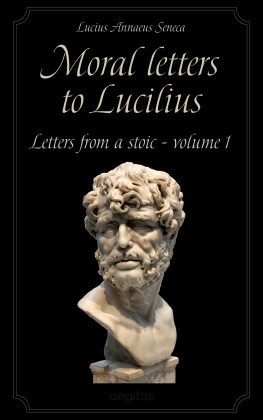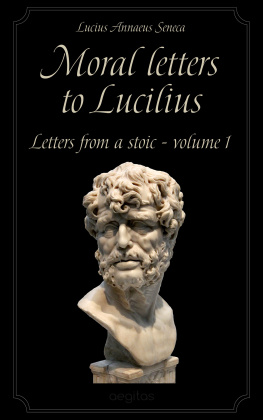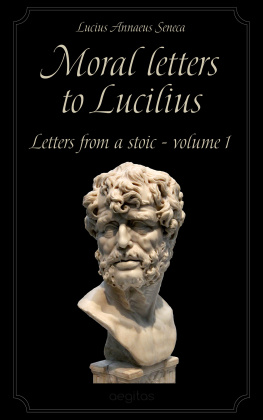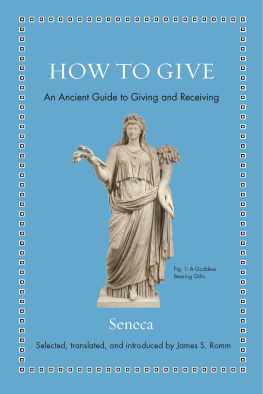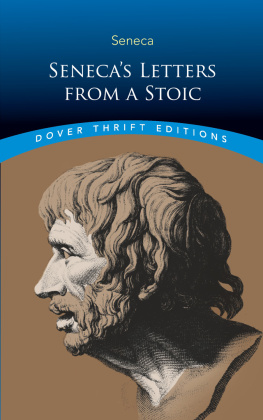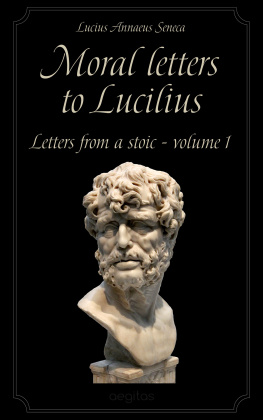
Lucius Annaeus Seneca
Moral letters to Lucilius
Volume 2
We have lost morals, justice, honor, piety and faith, and that sense of shame which, once lost, can never be restored.
encoding and publishing house
Notes
Vergil, Aeneid, v. 344.
Seneca is not speaking here of the three generic virtues (physical, ethical, logical), nor of the three kinds of goods (based on bodily advantage) which were classified by the Peripatetic school; he is only speaking of three sorts of circumstances under which the good can manifest itself. And in 36 ff. he shows that he regards only the first two classes as real goods. See Zeller, Stoics, p. 230, n. 3.<
Siccus (not in the sense of Ep. xviii. 4) here means "vigorous," "healthy," "dry"; i.e., free from dropsy, catarrh, etc.
Cf., from among many passages, Ep. lxxi. 20 f. and xcii. 16 ff.
i.e., constancy, fidelity, etc.
Ratio () is also defined as God, as Absolute Truth, Destiny, etc. The same idea is evident in the definition of sapientia (the object of philosophy) as rerum divinarum et humanarum... scientia (Cic. Off. ii. 2. 5,etc.), and nosse divina et humana et horum causas, etc.
A Spanish city, reduced and razed to the ground in 133 B.C. by Scipio Africanus, the conqueror of Carthage.
Cf. Ep. xxxi. 4 and footnote (Vol. I.). 14 f. Rackham translates as "moral worth," a reminiscence of .
One of the stock bits of heroism attributed to the ideal wise man. Cf. Epicurus (Frag. 601 Usener), Cicero, Tusc. ii. 7. 17, etc.
A slight variation of the idea in Cicero, De Orat. i. 196 si nos... nostra patria delectat, cuius rei tanta est vis ac tanta natura, ut Ithacam illam in asperrimis saxulis tamquam nidulum adfixam sapientissimus vir immortalitati anteponeret.
i.e., of the soul, of the body, and of external goods.
Buecheler thinks that this alliterative phrase of Seneca's is an echo of some popular proverb or line taken from a play.
Here Seneca is reminding Lucillius, as he so often does in the earlier letters, that the evidence of the senses is only a stepping-stone to higher ideas an Epicurean tenet.
Another definition, developing further the thought expressed in 12.
Transcriber's Note: The Latin, which Gummere translates politely, is: "Aliquem concubitus extinxit," i.e., "Others are extinguished during sex."
Frag.434 Usener.
Frag. 449 Usener.
Frag. 138 Usener.
See above, 47.
Clausula has, among other meanings, that of "a period" (Quintil. viii. 5), and "the rhythmic close of a period" (Cic. De Orat. iii. 192).
For a full discussion of this phrase see Conington, Excursus to Vergil's Aeneid, ix. 641.
For the story see Livy, ii. 12 ff.
A rare word sometimes spelled malacisso, used by Plautus (Bacch. 73) and Laberius, but not in a technical sense.
Porsenna and Tarquin.
See Introduction (Vol. I. p. x), and the opening sentences of Epp. lxxvii., lxxxvii., and others.
Seneca had a delicate constitution (see Introduction). In the letters he speaks of suffering from asthma (liv.), catarrh (lxxviii.), and fever (civ.).
Cf. lxxv. 1 qualis sermo meus esset, si una sederemus aut ambularemus.
i.e., the Stoics.
Banished from Rome in 92 B.C. Cf. Ep. xxiv. 4.
Vergil, Aeneid, i. 94 ff.
Cf. Livy, vii. 9. 6 ff.... legiones auxiliaque hostium mecum deis manibus Tellurique devoveo.
Ut litaret: i.e., that by his sacrifice he might secure an omen of success. Cf. Pliny, N. H. viii. 45, and Suetonius, Augustus, 96: "At the siege of Perusia, when he found the sacrifices were not favourable (sacrificio non litanti), Augustus called for more victims."
Donaria at the doors of temples signified public rejoicing; cf. Tibullus, i. 15 f. Flava Ceres, tibi sit nostro de rure corona Spicea, quae templi pendeat ante fores. Myrtle decorated the bridegroom's house-door; garlands heralded the birth of a child (Juvenal, ix. 85).
Cf. Pliny, N. H. iv. 13. Besides the Dead Sea of Palestine, the term was applied to any sluggish body of water.
Cf. Ep. lxvi. 18.
Stoicism preached "world-citizenship," and this was interpreted in various ways at different periods. The Greek teachers saw in it an opportunity for wider culture; the Romans, a more practical mission. For further discussion of this topic see Ep. lxxiii. 1 ff. Seneca's arguments are coloured by the facts of his life at this time.
Cf. Ep. lv. 3 ff. for the retirement of Vatia: ille latere sciebat, non vivere.
Causarii (Livy, vi.6) were soldiers on sick leave.
For an argument of the same sort see Horace, Epist. i. 1. 93-104:
Si curatus inaequali tonsore capillos
Occurri, rides...
... quid, mea cum pugnat sententia secum?
This is a reference to the saying of Epicurus, , "live in retirement."
Cf. Horace, Sat. ii. 5. 23 ff.: captes astutus ubique senum and vivet uter locuples sine gnatis... illius esto defensor. The captator was a well-known figure at Rome; cf. also Pliny's notorious enemy Regulus, and Juvenal's many words of scorn for those who practised the art.
i.e., Fortune's support comes from crowds.
Cf. De Ira, ii. 20 ut nimius ille fervor despumet.
Cf. Ep. ii. 3 nil aeque sanitatem impedit quam remediorum crebra mutatio.
Perhaps the converse idea of "living one's own life." It means "dying when the proper time comes," and is the common man's argument against suicide. The thought perhaps suggests the subject matter of the next letter.
Probably the birthplace of Lucilius.
Aeneid, iii. 72.
Although Socrates says (Phaedo, 61 f.) that the philosopher must, according to Philolaus, not take his own life against the will of God, the Stoics interpreted the problem in different ways. Some held that a noble purpose justified suicide; others, that any reason was good enough. Cf. Ep. lxxvii. 5 ff.
Telesphorus of Rhodes, threatened by the tyrant Lysimachus. On the proverb see Cicero, Ad Att. ix. 10. 3, and Terence, Heauton. 981 modo liceat vivere, est spes.
i.e., if he must choose between helping along his punishment by suicide, or helping himself stay alive under torture and practising the virtues thus brought into play, he will choose the latter, sibi commodare.
See the imaginary dialogue in Plato's Crito (50 ff.) between Socrates and the Laws a passage which develops this thought.
And to commit suicide in order to escape poisoning.
For a more complete account of this tragedy see Tacitus, Annals, ii. 27 ff. Libo was duped by Firmius Catus (16 A.D.) into seeking imperial power, was detected, and finally forced by Tiberius to commit suicide.
When the "natural advantages" ( ) of living are outweighed by the corresponding disadvantages, the honourable man may, according to the general Stoic view, take his departure. Socrates and Cato were right in so doing, according to Seneca; but he condemns (Ep. xxiv. 25) those contemporaries who had recourse to suicide as a mere whim of fashion.
By means of the cucurbita, or cupping-glass. Cf. Juvenal, xiv. 58 caput ventosa cucurbita quaerat. It was often used as a remedy for insanity or delirium.
Custodia in the sense of "prisoner" (abstract for concrete) is a post-Augustan usage. See. Ep. v. 7, and Summers' note.
i.e., by robbing oneself of life; but the antithesis to Vergil's phrase (Aen. ix. 613) is artificial.
A similar argument is found in Ep. lxv. 5 ff., containing the same figure of thought.
For a definition of honestum see Cicero, De Fin. ii. 45 ff., and Rackham's note, explaining it as " , the morally beautiful or good."
Next page
